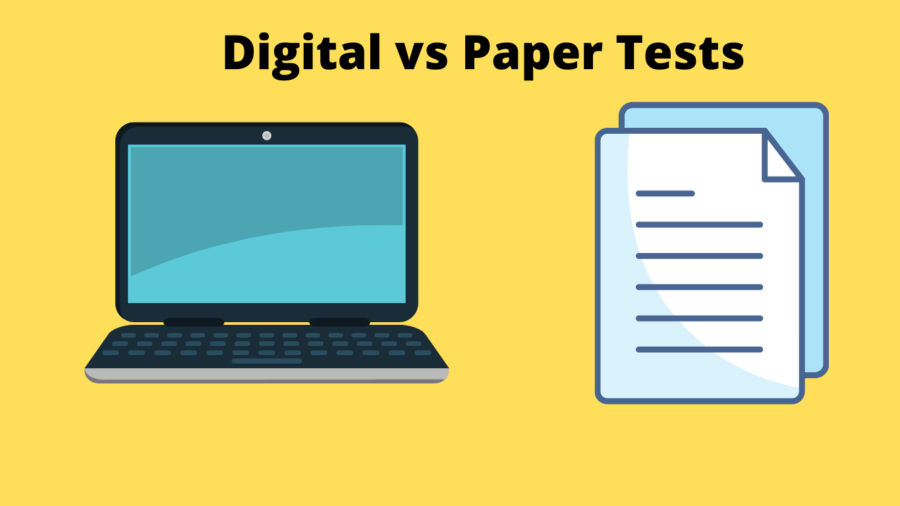PRO:
As technology advances, numerous educational departments are making the transition from standardized testing on paper to digital testing instead. When it comes to standardized testing, opening up the process of replacing paper versions with computer-based testing provides benefits towards students and educators by adding new opportunities for students and providing them with new perspectives on learning.
Benefits in making the switch to digital testing are that students will no longer need to wait and can get their test results immediately. Digital tests also have useful, interactive simulations and multimedia that test takers can use. Through these benefits, a great opportunity is provided for students to try something new rather than relying on paper packets
On paper, students don’t get their test results immediately. It has been documented that the majority of students experience having stress and anxiety while waiting for their test results back. Instant results help prevent this and having to wait for results as usual.
“With online exams, except for certain tests like essays, students can know their test results immediately resulting in less anxiety and pressure which affects their learning capability in the long run,” according to the eLearning industry online, a publishing platform that delivers content directed towards eLearning professionals.
Some students also have a harder time engaging and lack of focus when testing on paper. A simple paper and pencil test doesn’t draw any interest towards students and quickly loses their attention, making them feel boredom. The S.A.T (“Scholastic Aptitude Test”) , is a three hour standardized test by College Board, used widely for college admissions across the United States and is a prime example of a test that doesn’t create engagement for students. The S.A.T was first in use from 1926, and has been taken on paper ever since. However, the College Board announced that the SAT is working towards making the test digital instead beginning later in 2024.
Unlike paper tests, computer based tests have interactive simulation tools on questions that students are able to use which includes rulers, calculators, zoom in features, the option to eliminate question answers, and further. Other multimedia such as videos are also included. The use of these advanced tools help students feel more engaged in their testing and draws their focus back by having interesting material provided.
These interactive tool simulations are also very helpful towards students with accommodations and disabilities that find it hard to test on paper. They are able to use the tools the computer testing comes with to give them an easier time and complete the test quicker than it would be on paper without it being as complicated.
While paper testing is still a good choice and the norm for students, change can be just as beneficial and computer based tests should continue to grow throughout the educational communities and provide students with new opportunities.
Con:
Paper has been the dominant format for standardized testing for years, however, amid the pandemic, the College Board administered Advanced Placement (AP) exams digitally as well as several state-required tests. Now there is an argument for both sides regarding which format is optimal for test-taking,
Transitioning to digital formats would not only hurt students but give headaches to proctors of these exams.
For starters, online exams risk internet difficulties, speed issues, and security concerns that can prevent the test from being taken. This disproportionately affects low-income students who may not have the same access to technology as their peers. Digital test taking also increases the room for error as if the internet connection is not sufficient. In these cases, the test may not work or run smoothly. This issue is compounded by the fact that most standardized tests are timed..
We must also consider that some students cheat, even if proper measures are taken to minimize academic dishonesty. This can skew test scores and put students who follow the rules at a disadvantage.
When taking a paper test, a proctor monitors to make it extremely difficult for students to cheat, therefore putting everyone on equal footing.
On the other hand, if a proctor is present during a digital test. With taking a test through paper it is fairly simple to administer the test and leave no room for error. You present a student with instructions, pen, and paper and they can now take the test without the worry of error.
We also must consider that not all students are equally technologically proficient; if one does not know how to make use of a digital testing device, they could perform poorly on a test they might otherwise do well on.
Subjects like math should not be done digitally due to the fact most students complete math on paper already. Senior Mikaeel Nur feels that it’s complicated to do math digitally, he said.
“It is hard to plug [in] formulas on [the] computer and express my ideas how I want to,” Nur said.
Students already use digital devices for many hours in a day, whether that’s using their phones or completing assignments on their computer. A test would add around another two hours to personal time spent on electronics.
Students with processing difficulties may find it difficult to complete a test digitally as it is tough to go back and forth on an online test. Special Education English teacher Jesse Rutter feels that a paper test is more beneficial for these students.
“A lot of students have memory processing issues, when they have a hardcopy in front of them a lot of times it’s a lot easier to retrace their steps,” Rutter said.
Ultimately, it is most logical, efficient, and beneficial to stick with paper tests. Schools are always looking for ways to improve and advance, but in reality, the transition to digital tests would be taking a step back.
